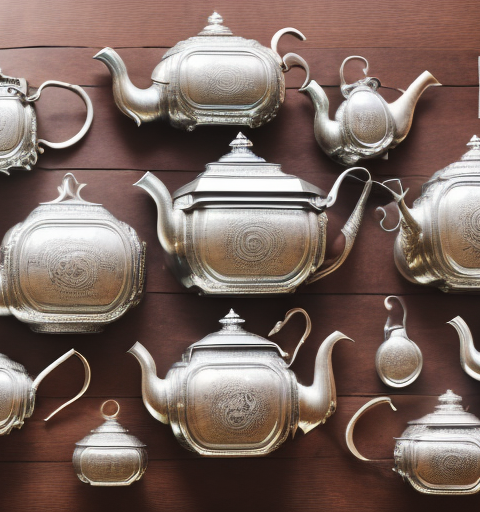Tea lovers know the joy of sipping a hot cup of tea, but they also know the frustration of dealing with tea stains. One particular area where tea stains can be stubborn is the ceramic lid of a teapot. The lid is often overlooked when it comes to regular cleaning, but it is essential to maintain its cleanliness for both hygiene and aesthetic purposes. In this article, we will delve into the importance of cleaning the ceramic lid of a teapot, explore the science behind tea stains on ceramic surfaces, discuss common mistakes to avoid when trying to remove the stains, provide essential tools and supplies for cleaning, and present a step-by-step guide to effectively removing tea stains from a ceramic teapot lid. We will also look at tried and tested home remedies, commercial cleaning products, pro tips for maintenance, and preventative measures for avoiding future tea stains. Furthermore, we will learn how to restore the shine and luster of a ceramic teapot lid after stain removal and troubleshoot common challenges encountered during the tea stain removal process.
Understanding the importance of cleaning the ceramic lid of a teapot
The ceramic lid of a teapot is in direct contact with the tea, and over time, it can become stained by the tannins and pigments present in tea leaves. These stains not only affect the appearance of the lid but can also impact the taste and quality of the tea. Additionally, an uncleaned ceramic lid can become a breeding ground for bacteria and mold, posing health risks. Therefore, it is crucial to regularly clean the ceramic lid to maintain its functionality, ensure a pleasant tea-drinking experience, and promote good hygiene.
Regular cleaning of the ceramic lid also helps to prevent the buildup of mineral deposits. When water is heated in a teapot, minerals such as calcium and magnesium can be left behind on the lid. These deposits can affect the flavor of the tea and may even clog the spout or strainer of the teapot. By cleaning the lid regularly, you can prevent the accumulation of these minerals and ensure that your tea tastes its best.
In addition to maintaining the functionality and taste of the tea, cleaning the ceramic lid can also prolong its lifespan. Over time, stains and dirt can cause the lid to deteriorate and become more prone to cracking or chipping. By regularly cleaning and caring for the lid, you can help to preserve its integrity and ensure that it lasts for many years to come.
The science behind tea stains on ceramic surfaces
Tea stains on ceramic surfaces occur due to a chemical reaction between the tannins in tea and the porous structure of ceramics. When tea comes into contact with the ceramic lid, the tannins bind to the surface, leaving behind a visible stain. The longer the tea is in contact with the ceramic, the deeper the stain becomes, making it more challenging to remove. The temperature of the tea can also impact the staining process, as hotter temperatures can accelerate the chemical reaction. Understanding this scientific process can help us approach the stain removal with more knowledge and effectiveness.
In addition to the chemical reaction between tannins and ceramics, other factors can contribute to tea stains on ceramic surfaces. One such factor is the type of tea used. Different types of tea, such as black tea, green tea, or herbal tea, contain varying amounts of tannins, which can affect the intensity of the stain. Additionally, the pH level of the tea can also play a role. Tea with a higher acidity level may cause more pronounced stains compared to tea with a lower acidity level. Therefore, considering the type and pH level of the tea can further inform our stain removal strategies.
Common mistakes to avoid when trying to remove tea stains from a teapot lid
When attempting to remove tea stains from a teapot lid, it is essential to avoid common mistakes that could damage the ceramic or render the cleaning process ineffective. One mistake to steer clear of is using abrasive materials or harsh chemicals that can scratch or erode the ceramic surface. Additionally, neglecting regular cleaning can lead to stubborn stains that become harder to remove over time. Overlooking the importance of proper drying and storage after cleaning can also contribute to the reoccurrence of tea stains. By avoiding these mistakes, we can ensure the safe and efficient removal of tea stains from a teapot lid.
Another common mistake to avoid when trying to remove tea stains from a teapot lid is using excessive force or scrubbing too vigorously. While it may be tempting to scrub aggressively in an attempt to remove stubborn stains, this can actually cause damage to the lid’s surface. Instead, it is recommended to use gentle, circular motions when cleaning, allowing the cleaning solution to work its magic without causing harm. By being mindful of the amount of pressure applied during the cleaning process, you can effectively remove tea stains without compromising the integrity of the teapot lid.
Essential tools and supplies for cleaning a ceramic teapot lid
To effectively clean a ceramic teapot lid and remove tea stains, it is essential to gather the right tools and supplies. One must-have item is a soft sponge or cloth that is gentle on the ceramic surface. A mild dishwashing soap that is free from harsh chemicals is also necessary for cleaning without causing any damage. Baking soda, vinegar, and lemon juice are common household items that can be used as natural cleaning agents. Additionally, a soft-bristle brush or toothbrush can be handy for tackling stubborn stains in hard-to-reach areas. By having these essential tools and supplies on hand, we will be well-equipped to take on the challenge of cleaning a ceramic teapot lid.
Another important tool to consider when cleaning a ceramic teapot lid is a non-abrasive scrub pad. This can be used to gently scrub away any tough stains or residue without scratching the surface of the lid. It is important to choose a scrub pad specifically designed for delicate surfaces to avoid causing any damage.
In addition to the tools mentioned above, it is also helpful to have a microfiber cloth for drying the teapot lid after cleaning. Microfiber cloths are highly absorbent and can effectively remove any remaining moisture without leaving behind lint or streaks. This ensures that the lid is left clean and dry, ready for use or storage.
Step-by-step guide to effectively removing tea stains from a ceramic teapot lid
To remove tea stains from a ceramic teapot lid, follow this step-by-step guide:
- Gently remove the lid from the teapot and rinse it with warm water to remove any loose tea leaves or residue.
- Create a cleaning solution by mixing a few drops of mild dishwashing soap with warm water in a bowl or sink.
- Using a soft sponge or cloth, dip it into the cleaning solution and gently scrub the stained areas of the ceramic lid in circular motions.
- For stubborn stains, create a paste by adding baking soda or a mixture of baking soda and vinegar to the cleaning solution.
- Apply the paste to the stains and let it sit for a few minutes to loosen the stains.
- Gently scrub the stained areas with a soft-bristle brush or toothbrush, paying extra attention to any crevices or textured surfaces.
- Rinse the lid thoroughly with warm water to remove any cleaning residue.
- Dry the ceramic lid with a clean, lint-free cloth, ensuring no moisture is left behind.
By following these steps, tea stains on a ceramic teapot lid can be effectively removed, leaving it clean and ready for use.
Tea stains can be particularly stubborn, especially if they have been left to sit for a long time. If the above steps do not completely remove the stains, you can try using a stronger cleaning agent such as white vinegar or lemon juice. Simply soak a cloth or sponge in the vinegar or lemon juice and scrub the stained areas of the ceramic lid. Rinse thoroughly with warm water afterwards.
Prevention is key to keeping your ceramic teapot lid stain-free. After each use, make sure to rinse the lid with warm water and wipe it dry with a clean cloth. Avoid leaving tea or any other liquids in the teapot for extended periods of time, as this can lead to staining. Regular cleaning and maintenance will help keep your ceramic teapot lid looking pristine for years to come.
Tried and tested home remedies for tackling stubborn tea stains on a teapot lid
Home remedies can be an effective and affordable way to tackle stubborn tea stains on a teapot lid. Here are a few tried and tested home remedies:
- Baking soda paste: Mix baking soda with water to create a thick paste, apply it to the stains, and let it sit for a few minutes before scrubbing with a soft sponge or brush.
- Vinegar solution: Soak the stained areas in a mixture of equal parts vinegar and water for a few hours, then scrub gently.
- Lemon juice: Squeeze fresh lemon juice onto the stains, let it sit for a few minutes, and scrub with a soft sponge or toothbrush.
These home remedies can be effective for removing tea stains from a teapot lid, but it’s important to test them on a small inconspicuous area first to ensure they do not damage the ceramic surface.
Another home remedy that can be effective for tackling stubborn tea stains on a teapot lid is using a mixture of baking soda and hydrogen peroxide. Create a paste by combining equal parts baking soda and hydrogen peroxide, then apply it to the stains and let it sit for about 15 minutes. Afterward, gently scrub the stains with a soft sponge or brush and rinse thoroughly. This combination can help break down the tea stains and remove them from the teapot lid.
Exploring commercial cleaning products specifically designed for tea stain removal
If home remedies do not provide the desired results or if you prefer a ready-to-use cleaning solution, there are several commercial cleaning products available that are specifically designed for tea stain removal. These products often contain gentle yet effective ingredients that can dissolve tea stains without damaging the ceramic surface. It is essential to follow the instructions provided by the manufacturer and test the product on a small area before applying it to the entire teapot lid. By exploring commercial cleaning products, one can find a convenient solution to tackle tea stains on the ceramic lid of a teapot.
When choosing a commercial cleaning product for tea stain removal, it is important to consider the specific needs of your teapot lid. Some products may be more suitable for certain types of ceramic or may have additional benefits such as providing a protective coating to prevent future staining. Reading product reviews and seeking recommendations from other tea enthusiasts can help you make an informed decision.
In addition to commercial cleaning products, there are also specialized cleaning tools available that can aid in the removal of tea stains. For example, soft-bristled brushes or sponges specifically designed for delicate surfaces can help gently scrub away stubborn stains without causing damage. These tools can be used in conjunction with the cleaning product to achieve optimal results.
Pro tips for maintaining a clean and stain-free ceramic teapot lid
To maintain a clean and stain-free ceramic teapot lid, here are some pro tips to keep in mind:
- Regular cleaning: Clean the teapot lid after each use to prevent tea stains from accumulating.
- Immediate action: If a tea stain occurs, try to remove it as soon as possible to prevent it from setting into the ceramic.
- Avoiding harsh chemicals: Stick to gentle cleaning agents and avoid abrasive materials that can damage the ceramic surface.
- Thorough drying: After cleaning, ensure the teapot lid is completely dry before storing it to prevent moisture and the subsequent formation of tea stains.
- Proper storage: Store the teapot lid in a clean, dry place away from any potential sources of tea stains, such as loose tea leaves or spill-prone areas.
By following these pro tips, you can maintain a clean and stain-free ceramic teapot lid for many tea-filled moments to come.
Preventing future tea stains on your teapot lid: Best practices and preventative measures
Prevention is key when it comes to avoiding future tea stains on your teapot lid. Here are some best practices and preventative measures:
- Use a tea strainer: When pouring tea into the teapot, use a tea strainer to prevent loose tea leaves from entering the teapot and potentially staining the lid.
- Empty and rinse after use: After each use, empty the teapot and rinse it with warm water to remove any remaining tea residue.
- Pre-soak: If the lid has visible stains, consider pre-soaking it in warm water for a few minutes before cleaning to help loosen the stains.
- Regular deep cleaning: In addition to regular cleaning, perform a deep cleaning of the teapot lid at least once a month to remove any deep-seated stains and keep it in optimal condition.
By adopting these preventative measures, you can minimize the occurrence of tea stains on your teapot lid and enjoy a clean and pristine teapot lid for longer.
How to restore the shine and luster of a ceramic teapot lid after stain removal
After successfully removing tea stains from a ceramic teapot lid, you may notice a loss of shine and luster. To restore the lid’s original appearance, follow these steps:
- Create a paste by mixing baking soda and water.
- Apply the paste to the ceramic lid and gently rub it in circular motions with a soft cloth.
- Rinse the lid thoroughly with warm water to remove any residue.
- Dry the lid with a clean, lint-free cloth.
- If desired, apply a ceramic glaze or polish specifically designed for teapot lids to enhance the shine and protect the surface.
By following these steps, you can restore the shine and luster of your ceramic teapot lid, making it look as good as new.
Troubleshooting common challenges encountered during the tea stain removal process
During the tea stain removal process, you may encounter certain challenges. Here are some common challenges and their solutions:
- Stubborn stains: For stubborn stains that resist common cleaning methods, try using a commercial stain remover specifically designed for ceramics.
- Discoloration or fading: If the ceramic lid’s color fades or appears discolored after stain removal, use a food-safe ceramic paint or glaze to restore the original color.
- Scratches or marks: If the teapot lid gets scratched during the cleaning process, try using a porcelain or ceramic repair kit to fix any visible marks.
By troubleshooting these common challenges, you can overcome any hurdles encountered along the way and successfully remove tea stains from your teapot lid.
In conclusion, by understanding the importance of cleaning the ceramic lid of a teapot, familiarizing ourselves with the science behind tea stains on ceramic surfaces, avoiding common mistakes, and equipping ourselves with the necessary tools and knowledge, we can effectively remove tea stains and maintain a clean and stain-free teapot lid. Whether through tried and tested home remedies or exploring commercial cleaning products, with proper care and attention, our teapot lid can be restored to its original shine and luster. Implementing preventative measures and troubleshooting common challenges further ensures a tea stain-free lid and a delightful tea-drinking experience. So, the next time you encounter tea stains on the ceramic lid of a teapot, you will be equipped with the knowledge and expertise to remove them effortlessly.






